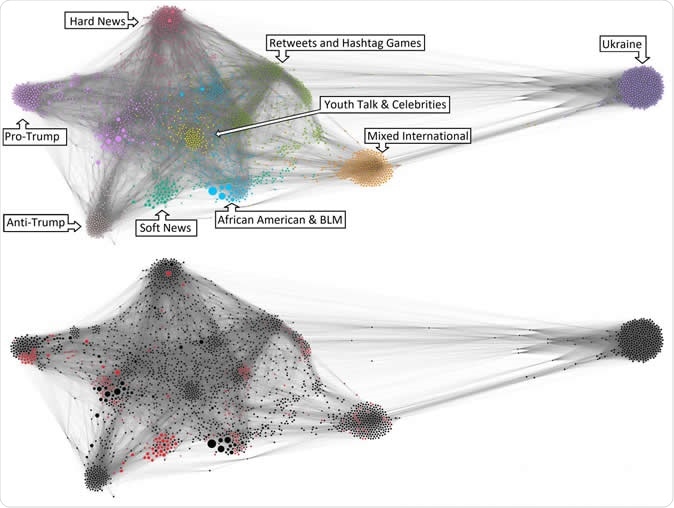There has always been controversy surrounding vaccines, but in the past, that was usually overridden by fear of the disease itself. The diseases vaccines prevent can be dangerous or even deadly. However, many anti-vaccination groups add to the confusion of people on the benefits of immunization against infectious diseases.
Now, amid the coronavirus disease (COVID-19) outbreak, scientists are racing to find a vaccine to stem the spread of the virus.
A new study has looked at 'Russian trolls' that polarized vaccination efforts and found that during the 2016 election cycle, politically opposing tweets by Russian trolls about vaccination, targeted people with specific political inclinations.
A team of researchers at the Annenberg Public Policy Center (APPC) of the University of Pennsylvania and Georgia State University has identified nine types of troll personas, from those fake boosters of Donald Trump to fake Black Lives Matters activists, and studied how these personas tackled vaccination.

Note: BLM = Black Lives Matter; IRA = Internet Research Agency. Fig. 2a (top) and 2b (bottom): Nodes (circles) represent the various Internet Research Agency accounts. Edges (lines) represent topical similarity between accounts. Size of nodes indicates accounts' reach, in terms of retweets. Color in Figure 2a indicates the different personas (the topical type of account). Color in Figure 2b indicates discussion of vaccines by the account (red indicates that the account mentioned vaccines at least once between 2015 and 2017; black indicates no vaccine mentions). CREDIT D. Walter, , "Russian Twitter Accounts and the Partisan Polarization of Vaccine Discourse, 2015-2017," American Journal of Public Health. Published online ahead of print, March 19, 2020: e1-e7. doi:10.2105/AJPH.2019.305564
The team found how the Russian Internet Research Agency (IRA) discussed vaccines. There were more than 2.8 million tweets posted by more than 2,600 accounts operated by the IRA between 2015 and 2017. Over the past years, Russian Twitter trolls have attempted to fuel the anti-vaccination debate in the United States. Using internet bots, these trolls shared opinions from both the view of anti-vaxxers and those who are pro-vaccination to confuse the ongoing debate.
"We found differences in volume and valence of vaccine-related tweets among nine thematic personas. Pro-Trump personas were more likely to express an antivaccine sentiment. Anti-Trump personas expressed support for vaccination. Others offered a balanced valence, talked about vaccines neutrally, or did not tweet about vaccines," the researchers wrote in the paper.
Vaccination debates and mistrust
Anti-vaccination discussions are still ongoing even with the United States' worst measles outbreak in 25 years, in 2019.
Now, the world is seeing the rapid spread of the coronavirus disease, which has so far infected nearly a million people. The ongoing global pandemic that has touched all continents except Antarctica and affected 180 countries and territories has sparked the need for a vaccine to prevent the spread of the virus. With the ongoing debate and mistrust for vaccination, these trolls may play a part in the search for a COVID-19 vaccine.
Although vaccination tweets only made up a small part of the messaging from these accounts over three years, these messages used pro-and anti-vaccination tweets. By polarizing vaccination, the trolls could potentially affect attitudes of people against vaccination, promote hesitancy to get vaccinated, and magnify health disparities.
"Russian trolls worked to polarize Americans on a health topic that is not supposed to be political," Yotam Ophir, an assistant professor of communication at the University at Buffalo and a former postdoctoral fellow at APPC, said.
"As our nation deals with the coronavirus pandemic, that type of politicization poisons the well of crisis communications for COVID-19 in ways that create tensions, mistrust and, potentially, a lack of intention to comply with government orders and health directives," he added.
COVID-19 and vaccination efforts
As COVID-19 spreads throughout the world, scientists and pharmaceuticals scramble to develop therapies and vaccines against it. If the Russian trolls continue spreading misinformation about vaccines, it can take a toll on worldwide efforts to contain the virus.
There are about 20 institutions and companies developing a vaccine against COVID-19. Scientists aim to develop a vaccine in about a year or so, depending on the fast-tracking of governments. However, if fewer people get vaccinated because of misinformation, the risk of another outbreak is inevitable.
The researchers in the study noted that there is some evidence that vaccine safety has been politically polarized. If this will go on, more people will have mistrust issues on vaccines, which are developed to help protect populations against infectious diseases.
Source:
Journal reference: